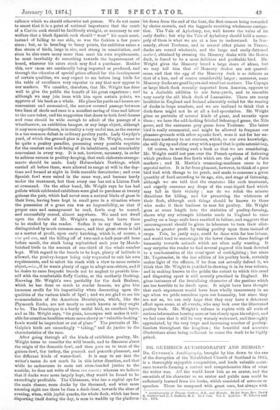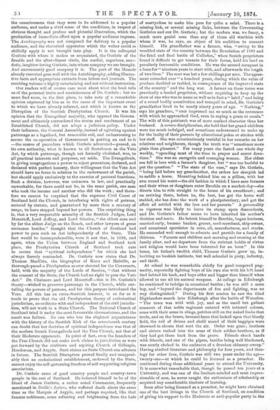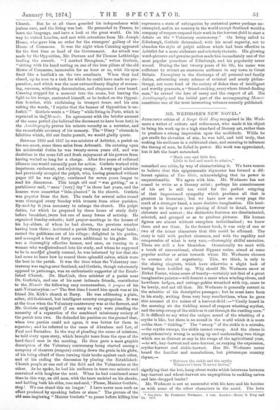DR. GUTHRIE'S AUTOBIOGRAPHY AND MEMOIR.* DR. GUTHRIE'S Autobiography, brought by
him down to the eve of the disruption of the Established Church of Scotland in 184a, is a thoroughly enjoyable composition, and lends valuable assist- ance towards forming a correct and comprehensive idea of what the writer was. All the world knew him as an orator, and the essentials of his character as an orator and public man could be sufficiently learned from his books, which consisted of sermons or speeches. These he composed with great care, but always with • Autobiography of Thomas Guthrie, D.D., and Memoir. By his Sons, Rev. David K. Guthrie and 0..I. Guthrie, M.A. ill 2 vols. Vol. L London : W. Isbister and CO. 1874.
the consciousness that they were to be addressed to a popular audience, and under a vivid sense of the conditions, in respect of obvious thought and profuse and pictorial illustration, which the production of immediate effect upon a popular audience imposes. The Autobiography was not composed for delivery to a popular audience, and the rhetorical apparatus which the writer could so skilfully apply is not brought into play. It is the colloquial -Guthrie with whom it makes us acquainted, the Guthrie of the fireside and the after-dinner circle, the cordial, sagacious, anec- dotic, laughter-loving Guthrie, into whose company we are brought. And uncommonly good company it is. The part of the Memoir already executed goes well with the Autobiography, adding illustra- tive facts and appropriate extracts from letters and journals. The resulting volume is highly entertaining and not without instruction.
Our readers will of course care most about what the book tells us of the personal traits and reminiscences of Dr. Guthrie ; but we must find room, in the first place, to take note of a remarkable opinion expressed by him as to the cause of the important event to which we have already referred, and which is known as the Disruption of the Scottish Presbyterian Church. It was his opinion that the Evangelical majority, who opposed the Govern- ment and ultimately surrendered the status and emolument of an Established Church, did not adopt a judicious policy. Under their influence, the General Assembly, instead of agitating against patronage as a legalised, but removable evil, and endeavouring to secure the co-operation of Government in putting an end to it —the course of procedure which Guthrie advocated—passed, on its own authority, what is known to all Scotchmen as the Veto Act, by which patronage, though not formally abolished, was, to all practical interests and purposes, set aside. The Evangelicals, in giving congregations a power to reject presentees, declared, and -declared with perfect honesty, their willingness that the Veto Act ahould have no force in relation to the endowment of the parish, but should apply exclusively to the exercise of pastoral functions. Such a division, however, was unknown to law, and practically unworkable, for there could not be, in the same parish, one man who took the income and another who did the work ; and there- fore we cannot be surprised that the supreme Civil Court of Scotland held the Church, in interfering with rights of patrons, .secured by statute, and guaranteed by more than a century of usage, to have stepped beyond her powers. The surprising thing is, that a very respectable minority of the Scottish Judges, Lord Moncrieff, Lord Jeffrey, and Lord Glenlee, "the oldest man and by far the ablest Judge on the Bench, and other lawyers of great eminence besides," thought that the Church of Scotland had power to pass such an Act independently of the State. This fact would be incomprehensible, were it not that, in 1688, and again, when the Union between England and Scotland took place, the Presbyterian Church of Scotland took care to secure that "spiritual independence" for which she had always fiercely contended. Dr. Guthrie now states that Dr. Thomas MacCrie, the biographer of Knox and Melville, as thorough-paced a Presbyterian as ever shouted for the Covenants, field, with the majority of the Lords of Session, "that without the consent of the State, the Church had no right to pass the Veto Act." Dr. Chalmers ,and Lord Moncrieff—this is Dr. Guthrie's theory—wished to preserve patronage in the Church, while cur- tailing the powers of patrons, and for this purpose introduced the Veto. All this has an extra-Scottish interest, in so far as it tends to prove that the old Presbyterian theory of ecclesiastical jurisdiction, co-ordinate with and independent of the civil jurisdic- tion, will not work in a State Church. The National Church of Scotland tried it under the most favourable circumstances, and the result was failure. No one who has the slightest acquaintance with the history of the Scottish Kirk of the seventeenth century can doubt that her doctrine of spiritual independence was that of the modern Scotch Evangelicals and the Free Church, not that of their Moderate opponents. In point of fact, even the founders of the Free Church did not make such claims to jurisdiction as were put forward by the stubborn and aspiring Church of Gillespie, Henderson, and Argyle. Such claims no State Church can advance in future. The Scottish Disruption proved finally and unappeal- ably that an ecclesiastical establishment, endowed by the State, .cannot enjoy the self-governing freedom of self-supporting religious associations.
Dr. Guthrie came of good country people and country-town people in the east of Scotland. He believed himself to be of the blood of James Guthrie, a rather noted Covenanter, frequently mentioned in Baillie's Letters, who suffered death about the same time as the Marquis of• Argyle, and perhaps required, like that famous nobleman, some softening and brightening from the halo of martyrdom to make him pass for quite a saint. There is a missing link, or several missing links, between the Covenanting Guthries and our Dr. Guthrie ; but the modern was, we fancy, a much more genial man than any of those old worthies with whom it was, he says, an object of his ambition to connect himself. His grandfather was a farmer, who, "owing to the troubled state of the country between the Revolution of 1688 and the fatal and final battle of Culloden," when Scotch proprietors found it difficult to get tenants for their farms, held his land on peculiarly favourable conditions. He was the second occupant in a lease for" nineteen years to dart with, and afterwards the length of two lives." The rent was but a few shillings per acre. The agree- ment extended over "a hundred years, during which the value of produce doubled or trebled, in consequence of the improved state of the country" and the long war. A farmer on these terms was practically a landed proprietor, without requiring to keep up the show of one who was in name as well as in fact a" laird ;" and being of a sound bodily cons.titution and tranquil in mind, Dr. Guthrie's grandfather lived to be nearly ninety years of age. "Nothing," says his grandson, "ever impressed me so much as the reverence with which he approached God, even in saying a grace at meals." The wife of this patriarch was of more marked character than her husband. A severe disciplinarian, she held that her grand-children were too much indulged, and sometimes endeavoured to make up for the laxity of their parents by educational pokes or strokes with her staff. She was conscientiously truthful in her remarks on her relatives and neighbours, though the truth was "sometimes more plain than pleasant." For many years she fasted one whole day weekly, "spending most of the time in prayer and secret devo- tions." She was an energetic and managing woman. Her eldest son fell in love with a farmer's daughter, but " was too bashful to put the question." "The state of the case," says Dr. Guthrie, "being laid before my grandmother, she orders her sheepish lad to saddle a horse. Mounting behind him on a pillion, with her arm round his waist—the old fashion in which I have seen farmers and their wives or daughters enter Brechin on a market-day—she directs him to ride straight to the house of his sweetheart ; and on arriving there, before he, the lout, has got the horse well stabled, she has done the work of a plenipotentiary, and -got the affair all settled with the lass and her parents." A personality so vigorous was likely to leave its stamp upon descendants, and Dr. Guthrie's father seems to have inherited his mother's decision and sense. He betook himself to Brechin, began business, married early, became banker, grocer, seed-merchant, ship-owner, and occasional speculator in corn, oil, manufactures, and stocks. He succeeded well enough to educate and provide for a family of thirteen. "Parents and children met morning and evening at the family altar, and no departure from the strictest habits of virtue and religion would have been tolerated for an hour." In this home, his father's twelfth child, Thomas Guthrie grew up, in- heriting no bookish instincts, but well schooled in piety, industry, and thrift.
At school he was remarkable chiefly for good-tempered pug- nacity, repeatedly fighting boys of his on size with his left hand tied behind his back, and boys older and bigger than himself when allowed to use all his natural weapons. At college in Edinburgh he continued to indulge in occasional battles ; he was still a mere boy, and "beyond the departments of fun and fighting, was no way distinguished." During his first session he saw the 42nd Highlanders march into Edinburgh after the battle of Waterloo. "The town was wild with joy, and as the small but gallant remnant of that noble regiment entered with tattered colours, some with their arms in slings, patches still on the naked limbs that trode, and on the brave, bronzed faces that looked upon that bloody field, the roll of drums and shrill sound of their bagpipes were drowned in shouts that rent the air. Order was gone ; brothers and sisters rushed into the arms of their soldier-brothers, as if they had got them back from the grave. Friends shook hands with friends, and one of the pipers, besides being well blackened, was nearly choked in the embraces of a drunken chimney-sweep." Having studied literature and philosophy for four years, and theo- logy for other four, Guthrie was still two years under the age- twenty-one—at which he could be licensed as a preacher. He continued during these additional years to attend the University. It is somewhat remarkable that, though he passed ten years at a University, and was one of the liveliest-minded and most impres- sionable of men, he never caught the enthusiasm of scholarship or acquired any considerable tincture of learning.
Soon after being licensed as a preacher, he might have obtained one of the best livings in the Church of Scotland, on condition of giving his support to the Moderate or anti-popular party in the Church. But he at all times guarded his independence with jealous care, and the living was loat. He proceeded to France, to learn the language, and have a look at the great world. On his way he visited London, and met with attentions from Mr. Joseph Hume, who gave him an order for the strangers' gallery of the House of Commons. It was the night when Canning appeared for the first time as head of the Government. An attack was made by the Opposition, Mr. Dawson and Sir Thomas Lethbridge leading the assault. "I marked Brougham," writes Guthrie, "sitting with his hand resting on one of the iron pillars of the old House of Commons, immovable for an hour or so, with his eyes fixed like a basilisk's on the two assailants. When they had closed, up he rose to a task for which he could have made no pre- paration, and which was the most extraordinary display of reason- ing, sarcasm, withering denunciation, and eloquence I ever heard. Canning stepped for a moment into the arena, but leaving the fight to his troops, contented himself, as he looked on the Opposi- tion benches, with exclaiming in trumpet tones, and his arm suiting the words, 'I rejoice that the banner of Opposition is un- furled." Guthrie wrote a "Diary " while living in Paris, which is reprinted in the:Memoir. Its agreement with the briefer account of the same period (he believed the document to have been lost) in the Autobiography proves his minute veracity as a narrator, and the remarkable accuracy of his memory. The "Diary " abounds in felicities which, did our limits permit, we would gladly quote.
Between 1830 and 1837 he was minister of Arbirlot, a parish on the sea-coast, some three miles from Arbroath. On entering upon his ministerial duties he was twenty-seven years old, and was doubtless in the more full and fresh enjoyment of his powers from having waited so long for a charge. After five years of enforced idleness one would naturally pant for action. Guthrie worked with impetuous, exuberant, and rejoicing energy. A very aged minister had previously occupied the pulpit, who, having preached without paper till he was eighty, continued for seven years longer to read his discourses. This tough old soul "was getting," as a parishioner said, " unco ' [very] dry" in those last years, and the hearers were somewhat "thin-planted" in the church. Guthrie was popular from the first. The roads for several miles round were thronged every Sunday with truants from other parishes. By-and-by it was necessary to enlarge the church. His pulpit duties, for which he prepared by three hours of study daily before breakfast, were but one of many forms of activity. He organised Sunday-schools ; held prayer-meetings in the houses of his lay-elders, of whom he had eleven, the previous number having been three ; instituted a parish library and savings' bank ; routed the publicans out of his village ; delighted in his garden, and managed a farm of forty acres additional to his glebe. He was a thoroughly effective farmer, and once, on turning to a woman who waslintroduced into his study, and whom he supposed to be in needof ghostly counsel, he was informed by her that she had come to learn how he reared those splendid calves, which were the beet in the parish. It was the time when the Voluntary con- troversy was raging over Scotland, and Guthrie, though vehemently opposed to patronage, was an enthusiastic supporter of the Estab- lished Church. Dr. MacCosh, then minister of a parish near Dr. Guthrie's, and one of his most intimate friends, contributes to the Memoir the following racy memorandum, a propos of his anti-Voluntaryism The first time I heard him speak was at his friend Mr. Kirk's church at Barry. He was addressing a plain, sober, old-fashioned, but intelligent country congregation. It was at the time when the Voluntary controversy was at the fiercest, and Mr. Guthrie andi myself (I am sorry to say) were pleading the necessity of a separation of the combined missionary society of the parish into two. He defended his position on the ground that, when two parties could not agree, it was better for them to separate ; and he referred to the cases of Abraham and Lot, of Paul and Barnabas. In the way of pleading the cause of missions, he told story upon story, which brought tears from the eyes of the hard-faced men in the meeting. He then gave a most graphic description of the Voluntary controversy being started among a company of shearers (reapers) cutting down the grain in his glebe, of his being afraid of them turning their hooks against each other, and of his ending the discussion by placing the Established- Church people at one end of the field and the Voluntaries at the other. As he spoke, he had his audience in tears one minute and convulsed with laughter the next. When he had continued some time in this way, an old man, with the tears undried on his cheeks, and holding both his sides, rose and said, 'Please, Meister Guthrie, atop! We can stand this no longer.' I have never seen such an effect produced by speaking before or since." The picture of the old man imploring "Maister Guthrie" to pause before killing him
represents a state of subjugation by oratorical power perhaps un- exampled, and in no country in the world except Scotland would a company of reapers suspend their work in the harvest-field to start a debate on the "Voluntary controversy." On being called to- Edinburgh, Guthrie determined, with his usual sagacity, not to- abandon the style of pulpit address which had been effective in. Arbirlot for a more elaborate and scholarly rhetoric. His glowing word-pictures and genuine pathos made him immediately one of the most popular preachers of Edinburgh, and his popularity never waned. During the last twenty years of his life, his name was sufficient to attract an enormous audience in any town in Great. Britain. Exemplary in the discharge of all personal and family duties, advocating every scheme of rational and manly philan- thropy, not more fond of the society of dukes than of intelligent and worthy peasants, a " friend-seeking, everywhere friend-fuading man," he earned the love of many and the respect of all. His Autobiography and the initial part of the accompanying Memoir constitute one of the most interesting volumes recently published.




































 Previous page
Previous page